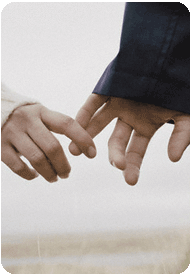Starting with the beginnings of expectations, the environment that a child grows up in and the people that influence that child will have an effect on him or her as they reach adulthood. A child will be the most familiar with the relationship their parents have, or lack of relationship. Rebecca’s parents, in the novel The Gravedigger's Daughter, did not have a healthy relationship to illustrate what a good marriage should be for their children. Her father grabbed her mother and shook her, yelling at her the whole time in front of their children (Oates 89). She had guessed her parents had been in love earlier on in their marriage, although she never saw any sort of affection between them (p. 237). Parents that remain in a healthy marriage are more than likely to have children who have similarly successful relationships than those who have divorced parents (Seiffge-Krenk, Shulman, and Klessinger p. 328). “The family context perspective maintains that a family’s values, cultural background, socioeconomic status, family structure, and other characteristics directly affect adolescent’s views about their future life course, including their expectations and desires about family formation,” (Plotnick 945). Other close adults to the child, who have successful marriages, will act as a model of marriage for the child. These real life examples of relationships will offer a realistic representation of how relationships work and the success and failure of expectations. If a child sees good things in an adult relationship they will probably want those qualities in their future relationships. They will also see the flaws and issues that they don’t want to happen in future relationships as well. Sadly, Rebecca did not have any examples of a good marriage while she was a child.
During the ages within adolescence, it is common for dating relationships to become an important part of growing up (Meirer, Hull, and Ortyl 511). Middle adolescence is the most common time for young people to start, normally short lived, dating experiences (Seiffge-Krenk, Shulman, and Klessinger p. 328). Adolescence is a time for self-discovery in the stage of life between adulthood and childhood. Young people use their relationships with the opposite sex as a way to find their own identity. Rebecca’s identity changed during her adolescence when she and Tignor shortly dated, got engaged, and were married by the time she was 17. She was no longer an orphan, a chambermaid, a virgin, but a married woman, a keeper of the home, and a soon to be mother. Adolescents begin thinking about what kinds of expectations they have in a different way than what they thought when they were children. These expectations are more detailed and thought out. Young adults expect themselves to enter into a marital relationship between the ages of 24-25 (Plotnick 925). Through more dating experiences and other life events expectations change as individuals reach a marriageable age. Adolescents expect their relationships to fill a need for companionship with a person from the opposite sex.
It is argued whether or not expectations are a good or bad thing. Some claim that realistic expectations are a healthy part of a relationship that has positive results; while others disagree and say they lead to disappointment and marriage dysfunction (McNulty and Karney 729). Expectations are good as long as they are reasonable and flexible to change and work with someone. People who are skillful communicators and problem solvers have better chances of having their expectations met. Communication and problem solving skills can help when conflicts arise. These people are able to resolve problems and work through issues (731). “Given that the benefits and costs of positive expectations depend on other relationships factors, the effects of cognitive variables on long term relationship outcomes may similarity depend on how those cognitions interact with the experiences couples are likely to encounter,” (740). People need to establish expectations or standards for what they want but they need to be expectations that are practical, realistic, and sensible.
Expectations come from real life relationships, role models or personal experience, but they can also come from society or mass media. Expectations can be set too high and unattainable, which will only lead to disappointment and failure. Standards that are reachable and sufficient improve the chances of having a successful relationship. Expectations are important but they need to be accommodating and able to change if need be. The identities of both people in a relationship are shaped by each other and what each person brings to the relationship. Relationships should not be unhealthy or unrealistic like Rebecca and Tignor’s. Relationships need to be about expecting the person themselves to fulfill their own goals and if both people can successfully do that then they will have a healthy relationship.

No comments:
Post a Comment